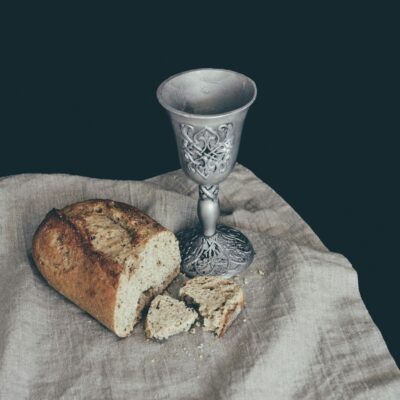This article is part 2 of a series on The Lord’s Supper. Click here for part 1.
The Lord’s Supper is a sacred act of worship, deeply rooted in Scripture, that unites believers with Christ and one another. In 1 Corinthians 11:17–34, the Apostle Paul provides crucial guidance on the meaning and practice of this sacrament, emphasizing its corporate nature, spiritual fellowship, and the serious consequences of partaking unworthily. This passage shapes the Reformed understanding of the Lord’s Supper as a means of grace that both nourishes faith and calls for reverence.
Paul begins by addressing problems in the Corinthian church’s practice of the Lord’s Supper (1 Corinthians 11:17–22). Divisions and selfishness marred their gatherings, with some eating their own meals while others went hungry, undermining the unity of the church. Paul stresses that the Lord’s Supper is a corporate act, repeatedly noting that it occurs “when you come together” (verses 17, 18, 20, 33). This communal emphasis underscores that the Supper is not a private ritual but a shared meal that reflects the church’s identity as the body of Christ. In Reformed theology, this corporate focus prohibits private participation, ensuring the Supper is celebrated within the gathered church for accountability and fellowship.
Central to the Lord’s Supper is the concept of koinonia, or fellowship, as seen in Paul’s words: “The cup of blessing that we bless, is it not a participation in the blood of Christ? The bread that we break, is it not a participation in the body of Christ?” (1 Corinthians 11:16). The Greek word koinonia conveys more than mere participation; it signifies a deep, spiritual fellowship with Christ and His people. Through the bread and cup, believers commune with Christ’s divine nature and with one another, united as one body by the “one bread” (verse 17). This mystery of fellowship transcends human understanding, offering a profound encounter with God that strengthens the church’s bond.
Paul also highlights the blessings and curses tied to the Lord’s Supper (1 Corinthians 11:27–32). He warns that partaking “in an unworthy manner” makes one “guilty concerning the body and blood of the Lord,” bringing judgment upon oneself. Such judgment may manifest as weakness, illness, or even death, as seen in Corinth. To avoid this, Paul instructs believers to “examine themselves” before eating the bread and drinking the cup, ensuring they discern the body of Christ—both His sacrificial body and the church as His body. This call to self-examination emphasizes reverence and repentance, aligning with the Supper’s role as a means of grace that deepens faith when received rightly.
The blessings of the Lord’s Supper are equally significant. When partaken worthily, it fosters spiritual nourishment, seals God’s promises, and strengthens communion with Christ. Paul’s words of institution (1 Corinthians 11:23–25), echoed in weekly worship, recall Christ’s command to “do this in remembrance of me,” pointing to His death and resurrection. The Supper is thus a proclamation of Christ’s finished work, celebrated “until He comes” (verse 26), blending remembrance with hope.
The corporate nature of the Supper also informs practical instructions. Paul urges believers to “wait for one another” when gathering to eat (verse 33), ensuring no one is excluded or humiliated. This reflects the Supper’s role in fostering unity and mutual care within the church. By guarding the table through self-examination and communal participation, the church upholds the sanctity of the sacrament and protects its members from judgment.
In summary, 1 Corinthians 11 presents the Lord’s Supper as a corporate, Christ-centered act of fellowship that demands reverence and offers profound spiritual blessings. It calls believers to examine themselves, commune with Christ, and unite as His body, proclaiming His death until He returns.
This is the second in a series on the Lord’s Supper. The next article will explore historical perspectives on the sacrament, from Roman Catholic to Reformed views.



